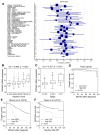Genetic Association Analysis of Cell Cycle Regulators Reveals YWHAZ Has Prognostic Significance in Prostate Cancer
- PMID: 32108043
- PMCID: PMC7078838
- DOI: 10.21873/cgp.20181
Genetic Association Analysis of Cell Cycle Regulators Reveals YWHAZ Has Prognostic Significance in Prostate Cancer
Abstract
Background/aim: This study aimed to identify the genes that cause biochemical recurrence (BCR) following radical prostatectomy (RP) in men with localized prostate cancer.
Patients and methods: A two-stage genetic association study of 19 single-nucleotide polymorphisms in 11 key cell cycle regulation genes was carried out. BCR-free survival after RP was evaluated in a discovery cohort of 458 patients with prostate cancer, and replication was investigated in another cohort of 185 patients.
Results: A consistent association was found between BCR and rs2290291 (discovery: p=0.008; replication: p=0.029). rs2290291 is located in the tyrosine 3-monooxygenase/tryptophan 5-monooxygenase activation protein zeta (YWHAZ), and was predicted to possess a regulatory function that affected YWHAZ expression. Furthermore, YWHAZ expression was frequently up-regulated in advanced tumours, and associated with poorer survival in patients with prostate cancer.
Conclusion: YWHAZ rs2290291 was found to be associated with BCR. YWHAZ may function as a putative oncogene during prostate cancer progression.
Keywords: Cell cycle; YWHAZ; biomarker; prostate cancer; recurrence.
Copyright© 2020, International Institute of Anticancer Research (Dr. George J. Delinasios), All rights reserved.
Conflict of interest statement
The Authors declare that they have no conflicts of interest in regard to this study.
Figures


References
-
- Siegel RL, Miller KD, Jemal A. Cancer statistics, 2019. CA Cancer J Clin. 2019;69(1):7–34. PMID: 30620402. DOI: 10.3322/caac.21551. - PubMed
-
- Freedland SJ, Humphreys EB, Mangold LA, Eisenberger M, Dorey FJ, Walsh PC, Partin AW. Risk of prostate cancer-specific mortality following biochemical recurrence after radical prostatectomy. JAMA. 2005;294(4):433–439. PMID: 16046649. DOI: 10.1001/jama.294.4.433. - PubMed
-
- Roehl KA, Han M, Ramos CG, Antenor JA, Catalona WJ. Cancer progression and survival rates following anatomical radical retropubic prostatectomy in 3,478 consecutive patients: Long-term results. J Urol. 2004;172(3):910–914. PMID: 15310996. DOI: 10.1097/01.ju.0000134888.22332.bb. - PubMed
-
- Morgan DO. Principles of cdk regulation. Nature. 1995;374(6518):131–134. PMID: 7877684. DOI: 10.1038/374131a0. - PubMed
-
- Elledge SJ. Cell cycle checkpoints: Preventing an identity crisis. Science. 1996;274(5293):1664–1672. PMID: 8939848. DOI: 10.1126/science.274.5293.1664. - PubMed
MeSH terms
Substances
LinkOut - more resources
Full Text Sources
Medical
